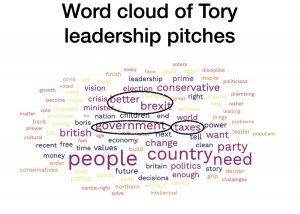For Labour to convince voters, it must first connect with them. In the current political climate, this is no easy task. 7 in 10 people don’t trust anything politicians say. 9 in 10 don’t think politicians have their interests at heart and 2 in 3 feel completely powerless over the decisions being made at Westminster. In this context, appealing to voters can be as effective as a radio station sending out a signal to a broken receiver: few will be tuned in and fewer still will be inspired. Any effective electoral strategy – and any genuine commitment to rebuild our democracy – must begin with a plan to reconnect and restore trust.
That starts by recognising and articulating some common values. Decades of scientific research has revealed something quite wonderful about the human condition: we are wired for compassion. It’s what drives us to care for our family, look out for our friends, and help our neighbours. Within our communities, it can be nurtured and enabled, or it can be stifled and suppressed. The key to cultivating this compassion and kindness is leadership: leadership in our schools, leadership at work and, fundamentally leadership in politics. We would argue that Labour needs to be explicit about this shared instinct – to care and connect – not only because its heritage can be found in those values, but because it will appeal to the electorate’s instincts.
Those instincts need to be activated and championed because, right now, we live according to quite alternate values. A climate of fear, anxiety, and hostility pervades our politics. Refugees, social security users, and liberation groups are being decried, vilified, and shamed. This approach not only weakens us as a society, but it is also injurious to political engagement and so may impact on Labour’s own electoral prospects. A landscape of cultural warfare does not offer fertile ground to any party, but especially one whose values are based in community and social solidarity. Although, as indicated above, we are wired for compassion, we can also be driven toward more selfish and self-seeking behaviours if society’s prevailing ideas emphasise such values. To make the party’s offer appealing to the electorate requires that messages of hate and difference are countered with those of compassion and inclusion.
That means avoiding language that divides and instead focusing on shared aspirations and common values: the need for security, opportunity, health, and happiness. It means using narratives and stories of care, community, and connection. It means trusting in the inherent goodness of people to move towards a party whose ultimate vision is one of compassion for all.
This can be backed-up by policies which amplify and exemplify the message. To help people feel safe, secure, and hopeful we need to build foundations of support. That is why Compassion in Politics has long argued for the enhancement of the public’s socio-economic rights. While the UK has recognised the UN’s Covenant on Economic, Cultural, and Social Rights – enshrining
access for all to food, housing, and an income – that right has never been implemented in domestic legislation. It means that the public have no legal recourse through which to ensure a basic standard of living. As we face a cost-of-living crisis, now is the time to call for and implement safeguards that would protect those in the most vulnerable circumstances and, by ensuring a genuine safety net, enhance our collective freedom. We are also delighted that the party has recently re-confirmed its commitment to enacting Section One of the Equality Act – requiring public bodies to consider the impact of their policies on socio-economic inequality – and urge the party to make good on that commitment if it is returned to government.
Ensuring coherence between public and political values need not be limited to vision statements and policy pledges. In the very conduct of politics, we often see standards of behaviour that fall well below expectations. At home and work, people are expected to treat one another with respect and to communicate honestly and sincerely. In the Commons, by contrast, MPs
routinely debase one another and their ideas and obfuscate to avoid scrutiny. Not only is this injurious to good policymaking, it is alienating to the electorate. A majority say that the way members of parliament speak to one another in the Commons decreases their respect for politicians and their willingness to engage in politics. While it is of course necessary for the opposition to critique government policies and oppose those they consider could be detrimental to the national interest, we would also urge individual MPs to seek out all available opportunities for common cause and, at all times, avoid descending into personal sniping and hyperbolic attacks. We know that the culture in our society is set by our leaders, their behaviour and also the policies they develop and implement. We need our political leaders to model a new kind of politics, setting the climate and tone for society as a whole.
Of course, if the electorate is to be convinced that Labour are committed to cleaning-up politics a change in style will need to be accompanied by some reforming substance. To that end we can recommend a number of policies that would be achievable, effective, and popular.
To bring greater transparency and honesty to politics, we have to change the rules. In marketing, healthcare, and teaching – professions where the public interest is clearly at stake – we have established a legal framework that requires honesty. Politicians, too, need a duty of candour. There are inevitably going to be debates about how best to enforce and oversee such a
duty but we can agree on one thing at least: the era in which rogue politicians can lie with impunity has to end. A process must be created in which individuals who knowingly and repeatedly lie can be held to account and, if necessary, face legal consequences.
Such a duty should extend to political advertising. The organisation Reform Political Advertising has noted that there has been a sharp increase in the number of false and misleading statements contained in party literature distributed during election campaigns. As the use of online advertising increases – in a domain where the rules are already scant, and accountability is unclear – this issue is only going to escalate.
While the use of misleading and dishonest electoral adverts is at worst unlawful and at least unethical, it is also especially harmful to the Labour Party who historically have not been able to match the electoral spend of the Conservative Party. Labour has a vested interest in ensuring that the promises, pledges, and claims made by other parties during an election campaign are,
at the very least, based on truth. In New Zealand a system already exists for ensuring this is the case: the Advertising Standards Authority is charged with overseeing the content of electoral adverts and, if necessary, can request that an advert be pulled from circulation if they deem it to be misleading or false. We should learn and borrow from their example.
As well as upholding higher standards across politics there is a specific need to ensure those who have the privilege to govern are accountable for their actions and decisions. The tools for doing so have, sadly, been significantly watered down by the current administration: the former prime minister has removed the need for Ministers to resign when they are found guilty of
breaching the Ministerial Code, resisted efforts to give the ethics advisor the power to launch their own investigations, and removed from the Code any reference to the need for honesty and transparency. There would be no better way for the Labour Party to communicate to the electorate that they believe in higher standards than to pledge in advance of forming any
government to increase the standards that government’s ministers must adhere to. This means committing to put the Ministerial Code on a statutory footing so that it can be properly enforced, empowering the role of the ethics adviser, and undoing the changes made by prime minister Johnson.
Building a more respectful, transparent, and compassionate politics is not only important to democracy. It will also enable good governance by the incoming administration: limiting the prospect of internal improprieties while creating an environment in which, even when critical, the opposition is expected to be honest and, where possible, constructive. To further improve the
machinery of government and policy-making we recommend a number of reforms aimed at creating a more supportive and inclusive environment. Our research into the culture of working life in politics, carried out with the Chartered Institute for Personnel and Development (CIPD) and supported by the Speaker of the Commons, found that many staff and MPs are currently
working in intolerable conditions. More than half say their workload is too high. 2 in 5 say they feel miserable at work, 1 in 5 “do not like who they are becoming”, and a third have experienced conflict in the last 12 months. Of those, 65% say that conflict remains unresolved.
To change this, we need to think about parliamentary work in a new way. We need to see it is a professional vocation that requires, like any modern business, structures to ensure Members and staff feel safe, supported, and empowered. If we want good policies, we have to create the conditions that are conducive to their development. That is why we recommend the creation of an independent HR function to oversee the employment of MP staff including salaries, training, progression, and complaint resolution. This would create transparency, a uniform approach, and ensure that conflict is managed professionally and independently. We also believe that Members should be given considerably more support than is currently in place – including
compassionate, carer, and parental leave. This would help Members manage their time while limiting the prospect of burnout and other work-related stress. Finally, the provision of training in parliament needs substantial improvement. To repeat: we must approach this issue with the intention of creating the highest possible standards in the parliamentary workplace. That means
ensuring a compulsory induction programme is in place for staff and MPs covering essentials like equality and diversity training and, where necessary, management coaching. We have also recommended – and the Forde Inquiry has endorsed this – the provision of compassion training to MPs and staff. This well-established training programme has been shown to reduce conflict,
build bridges, increase happiness, and improve motivation. This is a benefit we would like to see afforded to all MPs and their teams.
But of course, we cannot limit our view of politics to Westminster or constituency offices. Politics happens every day in workplaces, homes, and community spaces. Our historic culture of deference is being eroded, alignment with individual parties is being replaced by a trend toward vote-lending, and digital technology is providing individuals with greater power to engage in
online and offline debates and activism. Unless political parties can become invitational spaces which reflect this new age of pluralism and empowerment, they will quickly become outdated.
One tried and tested mechanism for doing this would be through citizens assemblies. While countries across the world – Canada, the USA, Australia, Poland, France, Belgium the Netherlands, Ireland, and more – have used citizens assemblies to great effect, Britain lags behind. The nascent climate assemblies prove, however, that this is a model of political decision-making that interests the public and can inspire genuine creative action: one of the lessons of these experiments was that, often, the public can display more ambition than their representatives. Ensuring the public’s voices are heard in between election-times is not the only advantage assemblies bring. They allow politicians to harvest the wisdom of the crowd – a crucial tool in the armoury of any representative seeking to tackle complex issues like climate breakdown and the cost-of-living crisis. They inform and give credibility and authority to the decisions made by governments and councils – making it less likely those decisions will be overturned in the next administration. And perhaps most transformational of all, they provide a space in which people of different views and backgrounds can come together for debate and discussion. In an era of division, this is to be celebrated and promoted. We would therefore recommend that the Labour Party become the champion for citizen democracy by establishing –
even in opposition – a programme of assemblies to garner public views on issues of national importance. Elsewhere we have also proposed creating “constituency assemblies” that would work, at a local level, to give MPs a sense of the views and concerns of constituents.
So, our appeal to the party is this: go deeper. Promises, pledges, and policies can only do so much. The fundamental nature of the public’s relationship with politics needs changing and the stitches of the body politic need mending. If the party can get halfway towards achieving that goal, so much else will follow.
Please note: Compassion in Politics works with all political parties in the interest of improving our political culture. This article should not be interpreted as offering support for any political party.




